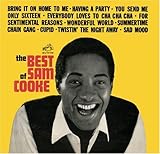My favorite new song stealing site
Since 2000, a buddy and I have had a never-ready-for-prime-time garage band: two guys covering 70s music without an audience (unless you count our daughters). Over the weekend, we were trying to learn a classic Sam Cooke/Lou Rawls tune, but neither of us had the MP3 file. (When I got home, I bought the MP3 file from Amazon).
Over the weekend, we were trying to learn a classic Sam Cooke/Lou Rawls tune, but neither of us had the MP3 file. (When I got home, I bought the MP3 file from Amazon).
So my buddy said, “let’s try Project Playlist.” Sure enough, it had a wide range of versions of the song available for streaming — all free. The search image would link to the various websites that had copies of the song for us to hear.
The company apparently isn’t paying royalties to the record companies. This seems to be the model for a startup based on redistributing other people’s content (like Deezer or GooTube): launch your company, distribute content, solicit revenues, and figure out how to pay for your inputs later.
It’s no wonder that the RIAA sued Project Playlist in April. The company’s defense (as quoted by CNET):
“We make it easy for our users to create a playlist that points to a series of music files hosted on third party Web sites,” Project Playlist said on its site. “We do not control those third party Web sites. We do not host music files.”This is exactly the same loophole as SurfTheChannel attempts to use for videos.
The company has high powered lobbyists and is trying to negotiate a deal with Sony BMG, and (it hopes) eventually the other three members of the Big Four.
We also tried last.fm, a legal interpretation of the same theme. At last.fm, we didn’t find Sam Cooke, but did find an Eric Clapton cut (which was on my laptop but not my buddy’s desktop).
Last.fm has a sugar daddy in the form of CBS, which spent $280 million to buy the company last year to diversify its radio properties. It otherwise seems unlikely they could make money given the onerous RIAA royalty schedule for music streaming.
Neither firm seems like it has a viable longterm business model. Consumers love it, but revenues are limited, other than the capital gains from selling out to the greater fool. But this is worse than even the typical troubled Web 2.0 startup, which at least has low costs due to user-generated content.
The problem is that online music startups have no control over their most important input. All the valuable content is owned by the Big Four labels, which thus has the unilateral right to dictate prices. Hollywood is furious at losing its high vinyl/plastic margins and is hoping to extract the same margins from online sales. It is a futile hope, but it will take years (if not decades) for Hollywood to come to terms with the Brave New World and adjust its expectations accordingly.

![[feed]](http://photos1.blogger.com/x/blogger2/6971/993546936938810/1600/z/962294/gse_multipart3851.gif)

1 comment:
There are ways round this, like We7's ad-funded model which makes money from audio and on site advertising so bands and rights holders get properly paid. For streaming, our users don't mind being exposed to ads in exchange for free music.
Steve Purdham
CEO - We7
www.we7.com
Post a Comment